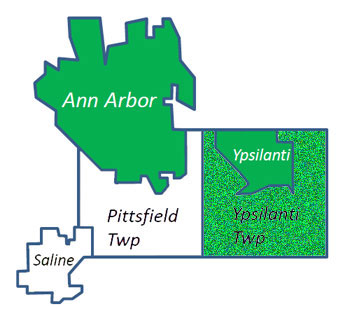Council Agenda: Transportation Governance
On the Ann Arbor city council’s Nov. 18, 2013 agenda is an item that first appeared on Oct. 21 – approval of a change to the governance of the Ann Arbor Area Transportation Authority. How would the AAATA’s governance change? And why did the Ann Arbor city council delay its vote?

Ypsilanti Township would become a member of the AAATA, if the Ann Arbor city council approves a change to the AAATA’s articles of incorporation at its Nov. 18, 2013 meeting.
The governance change would grant a request from Ypsilanti Township to be admitted as a member of the authority, joining the cities of Ann Arbor and Ypsilanti. The city of Ypsilanti requested membership in the AAATA just this summer, and that request was granted.
Some of the recent community conversation about the topic has included the idea that the governance changes were long overdue. That’s based on the fact that some transportation service to the two Ypsilanti jurisdictions – the city and the township – has been provided by the AAATA through year-to-year purchase of service agreements (POSAs) since at least the early 1980s.
As a result of action earlier this summer, the AAATA board has already expanded from seven to nine members, with one of the additional seats appointed by the city of Ypsilanti. The now-pending governance change, to add Ypsilanti Township as a member, would bring the total number of board seats to 10. [Amendment 3 of the AAATA articles of incorporation]
But the Ypsilanti jurisdictions asked for membership in the AAATA not just because they wanted a seat at the table. They also want to use that membership to help generate additional revenue in the AAATA geographic area – to pay for additional transportation services in all three jurisdictions. Those additional services are described in a five-year service improvement plan the AAATA has developed. The additional services – which include extended hours of operation, greater frequency, and some newly configured routes – were the topic of a series of 13 public meetings that were scheduled from Oct. 17 through Nov. 14.
For the city of Ann Arbor, the five-year plan would mean 33% more service, according to the AAATA. It’s the additional services, and the revenue needed to pay for them, that gave some Ann Arbor city councilmembers pause on Oct. 21, 2013, when the item first appeared on the agenda.
This article reviews some additional context, including the taxing powers of the AAATA, the issue of equity among jurisdictions, the AAATA’s performance as a transit authority, and a couple of vignettes from the series of public meetings held over the last month by the AAATA. [Full Story]



